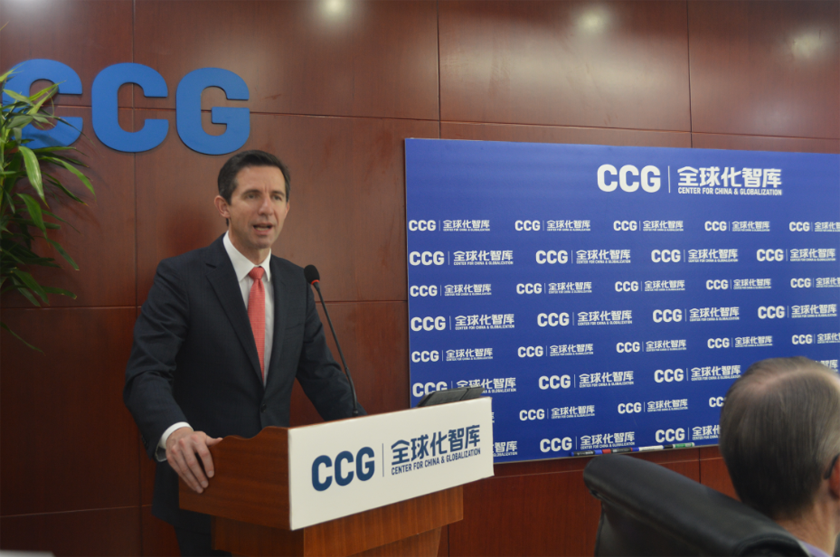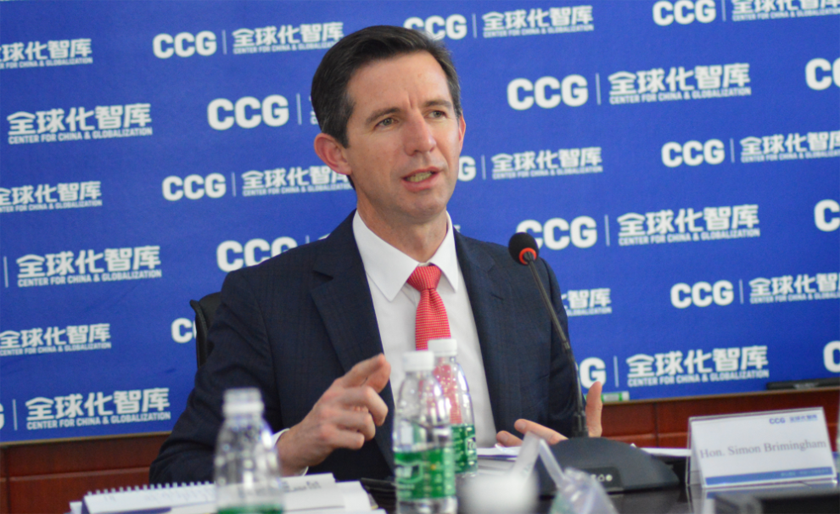Australia and China: Mutual benefits through trade liberalisation and multilateral trade reform
August 07 , 2019
On August 2, Australian Minister for Trade, Tourism and Investment Simon Birmingham, visited the Center for China and Globalization (CCG) headquarters in Beijing to deliver a speech on the topic of Mutual benefits through trade liberalization and multilateral trade reform. During his speech, he exchanged ideas with CCG experts on issues such as the Regional Comprehensive Economic Partnership (RCEP), trade opportunities, the role of the US and China in international trade, and the mutual benefits of trade liberalization and multilateral trade reform.

Trade opportunities and the importance of RCEP
Birmingham pointed out that Australia wants to deepen economic relations with China and is committed to concluding RCEP negotiations. He expressed hopes for the future of the RCEP.
Birmingham emphasized that RCEP is not only beneficial for Australia and China but also for the 10 members of the Association of Southeast Asian Nations (ASEAN). He emphasized that RCEP is globally significant because of its economic benefits, its symbolic weight and the opportunities for open trade it will provide.

The US and China should work together to enhance their partnership
Birmingham stressed that the US and China should work together to enhance their partnership and boost economic growth.
He said that trade tension creates uncertainties for global growth that incur costs for all. The Australian minister added that China and America should take the responsibility that comes with their power and economic weight and that other nations should be involved and play a part. Birmingham also said that dialogue between Australia and China can help to make a contribution in this regard.
An open market is the best system for all
Australian Prime Minister Morrison recently characterized the foundations of the international order as respect for the individual sovereign state, no matter how large or small, and the ambition that each may be able to engage and participate with the security afforded by a common set of rules that means they can get a fair go, free of coercion. Birmingham also added that a rules-based open market is the best system for all.
Australia’s domestic reforms
During his speech, Birmingham covered issues such as Australia’s domestic reforms, tariff reductions, competition policy, reforms of banking and superannuation, and regional and global trade policy.
He also summarized Australia’s contributions to the international trading system through helping to shape bilateral and regional trade agreements which go beyond WTO commitments.
Australia wants good economic relations with China
Birmingham affirmed that Australia welcomes the Belt and Road Initiative and its potential to connect the region with trade and infrastructure.
He also underscored how the China–Australia Free Trade Agreement enhances bilateral economic cooperation. In the last 10 years, the stock of Chinese direct investment in Australia directly has grown from $3.6 billion to more than $40 billion.
He emphasized that after the China-Australia Free Trade Agreement (ChAFTA) came into force in 2015, two-way goods and services trade reaches the high record of $215 billion in 2018. Australia is China’s 7th largest source of imports.
China is the second most popular destination for Australians
Birmingham said China is the second most popular destination for Australian students and tourists. He also added more than 1.2 million Chinese are living in Australia
Australia and China should work together in three areas
Birmingham noted that Australia and China should work to revive the dispute settlement system and restore confidence in free trade.
He added that two countries should work together to help update the WTO rulebook. China’s participation in the fisheries subsidies negotiations and the e-commerce negotiations at the WTO should contribute to forming new rules for modern economy.
He also mentioned that Australia wants to work with China to boost the participation of all developing and the least developed countries in the global trade system. Birmingham also added that Australia is ready to work with China and other countries to find solutions for future growth and to build confidence.
CCG experts who participated in the event were Wang Huiyao, president of CCG; Gong John, professor, University of International Business and Economics, Jiang Shan, senior fellow of CCG, former director-general of MOFCOM; Su Qingyi, associate fellow and deputy director, Division for International Trade at the Institute of World Economics and Politics, Chinese Academy of Social Sciences; Zhou Mi, deputy director of Division for America and Oceania, MOFCOM Chinese Academy of International Trade and Economic Cooperation; Zhou Xiaoping, senior fellow of CCG, former deputy Permanent Representative at Permanent Mission of China to the United Nations Office in Geneva
Attendees from Australian Embassy in Beijing were Graham Fletcher, Australian ambassador-designate to China; Rachael Thompson, minister’s chief of staff; Benn Ayre, minister’s senior media adviser; Elizabeth Peak, minister counselor (Economic); Alexandra Dawes,acting counsellor (Economic); Meaghan Shaw, first secretary (Public Affairs);Dale Jasper, first secretary (Economic); Yadan Ouyang, communications manager.
Also in attendance at the event were Chen Guanqi, general manager Netherlands in China; Camille Bortolini,commerce andinvestment specialist, French Embassy Beijing; Guo Chunmei, chief of South Pacific Unit, Institute of South & Southeast Asian & Oceanian Studies, CICIR; Jin Si, director of Office of International Initiative of Fazheng Group; SeHun Kim, second secretary, Embassy of Republic of Korea Beijing; Lyndon Radnedge, head of Multilateral Trade Policy, Economic Section, British Embassy; Bojana Stankovic, adviser (economy), Royal Norwegian Embassy in Beijing; Song Yinghui, executive chief, Unit of Regional Integration Studies, Institute of South & Southeast Asian & Oceanian Studies, CICIR; Xin Wan, global business development manager, VIPKID; Alvin Wong, first secretary, Singaporean Embassy in Beijing; Alvin Wong, first secretary, Singaporean Embassy in Beijing; Leon Wang, investor general manager, International Business Center at Far East Holding Group for Destination Marketing, Ctrip.com; Kavish Bisseswar, second secretary, Embassy of the Netherlands in China.






